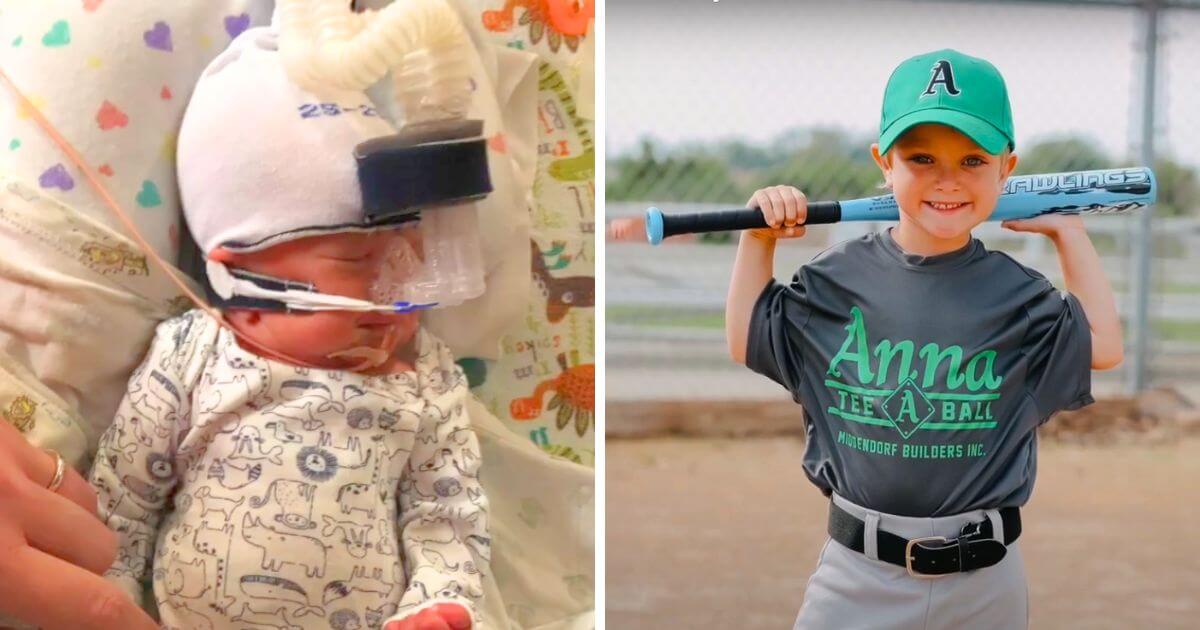A baby who was given a 1% chance of survival after his mother experienced leaking of amniotic fluid at just 17 weeks is now thriving at nearly five years old.
Deanna Payne had intended to go for a family hike with her husband and two children the day she realised something was wrong with her pregnancy.
“I felt like my water may have broken”, Deanna said. “But I was 17 weeks pregnant”.
At an ultrasound, Deanna’s doctor suspected preterm premature rupture of membranes (PPROM), which is the leaking of amniotic fluid before 37 weeks of pregnancy. She was referred to a labour and delivery unit where her diagnosis was confirmed.
Deanna and her husband Chris were then given the news that their unborn son had a 1% chance of survival.
The couple were offered the option of aborting the child
Deanna was at a greater risk of infection the longer she remained pregnant following the rupture of her amniotic sac membrane. At the same time, the child was at risk of being born with underdeveloped lungs.
“We were devastated and didn’t know what to do because termination just wasn’t in the cards for us”, Deanna said. “We just spent 45 minutes watching our son on an ultrasound, scared, unsure of the future”.
“We heard the heartbeat, and we just weren’t OK with terminating the pregnancy”, she continued. “And we were just hopeful that he was that 1%”.
Deanna was placed on bed rest for six weeks at home, and then was admitted to the labour and delivery unit at 23 weeks pregnant to be monitored. Her husband and children visited multiple times a week from their home about an hour away.
“We would have family dinner, and then he would return home and come back again on Saturday afternoon and stay overnight. Just the two of us”, Deanna said. “And then he would take home my laundry, clean it, and bring it back. He’s the real superhero here”.
The nurses in the labour and delivery unit were also very supportive of Deanna.
“These ladies helped me make it through 60 long, emotional days where we didn’t know what the outcome was going to be”, Deanna said.
One of the nurses suggested that Deanna make a paper chain in her room to count down to her son’s due date. Every morning she would cut a link off from the chain, often FaceTiming her two children to show them the shorter length.
“It was a visual reminder that we were getting closer to our goal”, she said.
Baby Rhett couldn’t wait to be born
Deanna felt that something was different on her daughter Ivy’s second birthday.
“I said, ‘I can’t pinpoint what it is, but I feel like the baby is coming’”, she said.
Tests indicated that Deanna had a partial placental abruption, which meant that her placenta had partially detached from the lining of the womb, causing maternal bleeding and keeping nutrients and oxygen from the baby.
Deanna was given steroids for a few days to help the baby’s lungs develop and then was induced. Baby Rhett was born at 31 weeks and three days gestation.
“I had a sense of relief”, Deanna said, “but was scared and uncertain about any other significant challenges Rhett might face”.
Rhett was quickly taken to be intubated in the neonatal intensive care unit (NICU) as his lungs were weak. He spent 32 days in the NICU, with his family staying nearby.
“You can’t do anything for your child”, Deanna said. “And that’s a hard spot to be in as a parent”.
When they were finally able to take Rhett home, Deanna was anxious that there would be further complications.
“I was waiting for the pendulum to swing the other way”, she said, “because it was unbelievable that everything remained stable”.
However, now at nearly five years old, Rhett is doing well and gives no obvious indication of any of the challenges he faced as a newborn.
“Strength, perseverance, and faith”, Deanna said. “Those are the three things that I want him to think about when he learns about his story”.
Abortion offered as a solution to disability or risk
A doctor suggested that Rhett should be aborted to lower the risk of his having underdeveloped lungs or his mother becoming exposed to infection. There are numerous personal stories from women who, after receiving a prenatal diagnosis of fetal disability, were put under pressure to have an abortion, often by medical professionals themselves.
While much of the evidence is anecdotal, the phenomenon is frequent enough that in 2020, the Royal College of Obstetricians and Gynaecologists (RCOG) joined with the Royal College of Midwives and the Society and College of Radiographers to release guidelines emphasising the importance of a non-directive approach to prenatal screening for Down’s syndrome, Edwards’ syndrome and Patau’s syndrome.
The guidelines stress throughout that the results of prenatal testing should be given and discussed in a “non-directive” manner, such that, whether a test indicates that a baby has Down’s syndrome or not, no parent should feel pressured into a decision about whether or not to have an abortion.
Originally set at 28 weeks, the abortion limit was lowered in 1990 to 24 weeks gestation in reflection of medical and technological advances that had resulted in improving survival rates for babies born before 28 weeks gestation. Since then, however, further medical advances have meant that babies born below 24 weeks gestation are increasingly able to survive.
Spokesperson for Right To Life UK, Catherine Robinson, said “Deanna and Chris’ bravery in refusing an abortion in the face of doctors’ suggestions should be commended. It is wonderful that Deanna is speaking out about her experiences”.












